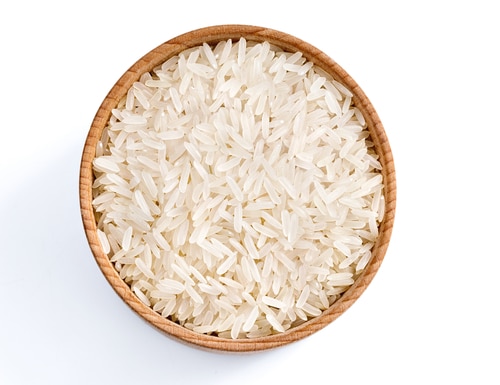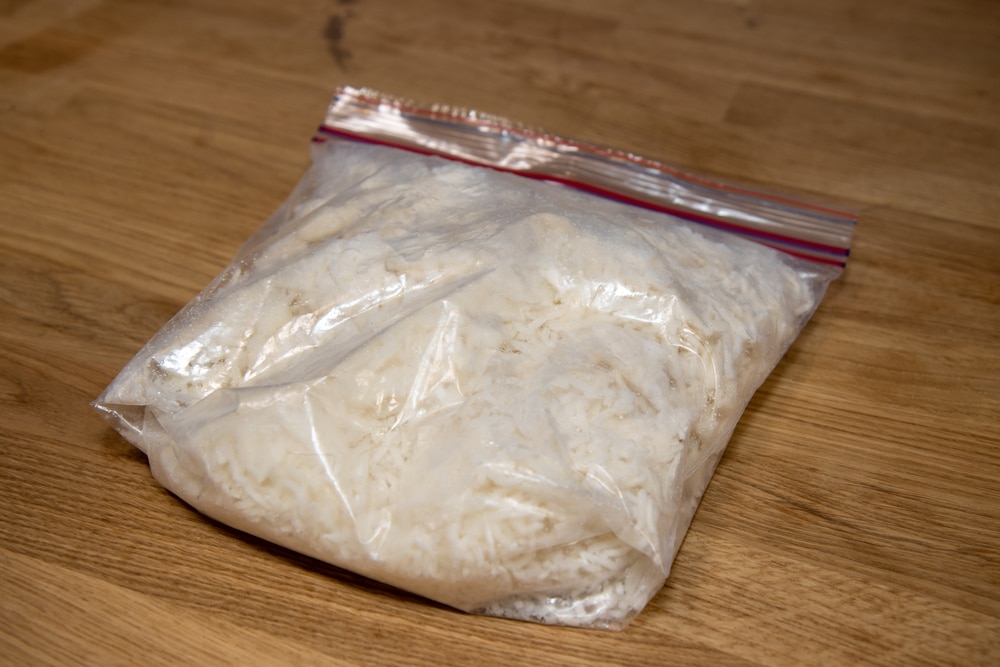With the versatility to be used as a main dish, a side dish, or an ingredient in various other words, coupled with its seemingly endless shelf life, rice is a staple item in many pantries. But how long does uncooked rice last? And is there a way to make rice last even longer?
Can you freeze uncooked rice? If you’ve ever wondered what the answer to these questions is, we’ve got you covered.
Can You Freeze Uncooked Rice?

To put it simply, yes, you can freeze uncooked rice. Freezing uncooked rice or freeze-drying your rice can help extend the product’s shelf life, but it is also the best way to keep kitchen pests out of your rice.
The larvae of rice weevils, the bugs that like to make their homes in bags and boxes of rice, look almost identical to grains for rice, so keeping your uncooked rice in a place that it is safe from nesting weevils is of the utmost importance.
How To Freeze Uncooked Rice
To freeze uncooked rice, you will need the following items: rice (dry and raw) and a sealable storage container (freezer bags and Tupperware containers are both suitable choices). If you have a device for vacuum sealing, you can also use that.
To freeze your rice, you will need to ensure that the rice is 100% dry. Ensuring there is no moisture on the rice will ensure that there is no mold growth for freezer burn, prolonging the lifespan of your frozen rice.
Next, pour the rice into your freezer bag or container. Seal the bag or container, ensuring that the container is fully sealed so that no excess air or bacteria can get into the container. Once you’ve prepared your rice containers, place them in the freezer.
Your freezer should maintain a temperature of zero degrees Fahrenheit to ensure that your frozen foods are kept at a safe temperature.
To defrost your rice, you can either move the frozen rice from the freezer to the refrigerator and allow it to thaw overnight, or you can place the container under cold running water if you need the rice to thaw faster. If you use the running water defrosting method, ensure that the container remains tightly sealed to ensure no moisture gets into the container.
Avoid using heat to defrost your frozen rice, as it can encourage the growth of harmful bacteria.

How Long Will Uncooked Rice Last in the Fridge/Freezer
As we mentioned earlier, freezing uncooked rice is an excellent way to extend the shelf life of your rice. But how long does dry rice last on average, and how much does freezing affect the product’s lifespan? Let’s break it down.
White rice, wild rice, jasmine rice, and basmati rice have a seemingly infinite shelf life. If kept in dry, safe conditions, these types of rice can last 4-5 years in the pantry. The problem with storing rice in a pantry is that it can be susceptible to bacteria growth or insect infestations.
So how much will these types of rice be impacted by freezing? Quite a lot. Freezing white rice will increase the lifespan of your uncooked by as much as 25 years. That’s right: freezing uncooked rice can make some types of rice last for 30 years!
In contrast, the shelf life of brown rice is significantly shorter, even if it’s kept in ideal conditions. Because brown rice has a higher oil and amino acid content, it will only survive for six months if kept in a pantry. Refrigerating or freezing your uncooked brown rice can extend the product’s shelf life to 12-18 months.
If you like to buy rice in bulk, freezing your rice while it is uncooked is the best way to ensure your rice has the most extended lifespan possible.

How To Tell If Your Frozen Uncooked Rice Is Bad
Since white rice has such a long shelf life, it can be challenging to determine when it has gone wrong. However, there are some obvious signs that you can look for to check the health of your rice.
If your rice has changed color or texture, you should be wary. If the rice has visible mold, or you can see insects in the rice, you should immediately dispose of the rice and disinfect the container that was holding and the area that the container was in. While rice weevils’ larvae look incredibly similar to grains of white rice, the adult weevils are reddish-brown and relatively easy to spot in a bowl or container of rice.
Despite being named “rice” weevils, the insects will migrate to other food products in the vicinity if given the opportunity, so if you suspect that your rice might have attracted some insects, make sure to check the surrounding areas to ensure they have not contaminated any other products.
Brown rice, on the other hand, is much easier to determine if it has gone wrong. Once spoiled, brown rice will feel as if it has been coated in oil and will emit a foul odor. While it does not have the remarkable shelf life of white rice, being able to tell if your rice is safe to eat quickly can save you the guesswork and unnecessary waste of tossing rice because you’re not sure about the quality.
What To Do With Frozen Uncooked Rice
Rice is genuinely one of the most versatile dishes, with many uses that extend beyond the food world. Here are some ways of the many ways that you can use uncooked rice:
Saving You Electronics
A bowl of uncooked rice has saved many phones after they’ve been submerged in water. Rice is incredibly absorbent to put a phone or other waterlogged electronic device into a bowl of uncooked rice overnight. The rice will absorb the water from the device, leaving it in more or less perfect shape.
Hot/Cold Compress
You can also use rice for a hot or cold compress by filling a sock with rice and putting the makeshift compress in the microwave or freezer, depending on the temperature you need the compress to be. A DIY compress is a quick and easy fix if you require first aid but don’t have ice or a traditional hot compress available to you at the moment.
Of course, there are plenty of traditional ways you can use rice in your kitchen. Here are some quick and easy recipes for rice dishes that you can try out:
Salsa Rice
What you need:
- 1 cup of rice
- One cup of salsa—homemade or store-bought will work, and the level of spiciness is up to your preference.
- Fill a pot or rice cooker with rice and water, as you usually would. Next, pour your salsa into the mixture
- Remove rice from the heat when it has finished cooking.
The rice will absorb the salsa into its grains, taking on the flavor and color of the salsa, with any “chunks” or vegetables will be mixed into the dish. Salsa rice is a great dish to add some bulk and spice to a burrito or taco salad.
Stir Fry
What you need:
- 1-2 cups of rice (depending on how many portions you are looking to make)
- 1-2 cups of your preferred protein (chicken, tofu, beef, etc.)
- 1 cup of chopped vegetables (fresh or frozen)
- One teaspoon of sesame seed oil
- One tablespoon of soy sauce
- Fill a pot or rice cooker with rice and water and let it cook
- Add your protein and vegetables to a greased skillet
- Add sesame seed oil, soy sauce and your favourite spices to your skillet for flavor
- Let your protein and veggies simmer until fully cooked, stirring to ensure nothing burns
The stir fry is a staple rice dish that is quick and easy to make. You can mix and play around with the ingredients you use, so your entree can be new and fresh every time.
Freezing Rice: In Conclusion
Rice is an incredibly versatile dish that you can use for a variety of different things. With a dish so versatile, you need to be conscious of how you are storing it not to spoil. Of course, dry rice has an incredible shelf life when left at room temperature, but to get the most use out of your rice, you need to make sure you are storing it properly.
So, can you freeze uncooked rice? Yes, and freezing your uncooked rice is an excellent way to extend the product’s lifespan and keep it safe from bacteria and other possible contaminants. Freezing rice can extend the shelf life of your rice anywhere from 18 months to 30 years, depending on the kind of rice you are using.
Now that you have an idea of the pros to freezing your rice and different ways to tell if your rice has spoiled, you’ll never have to worry about your rice going wrong again.






